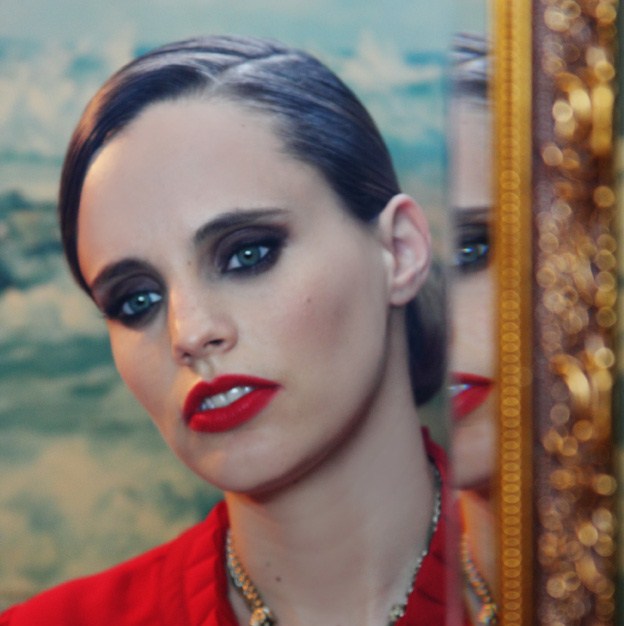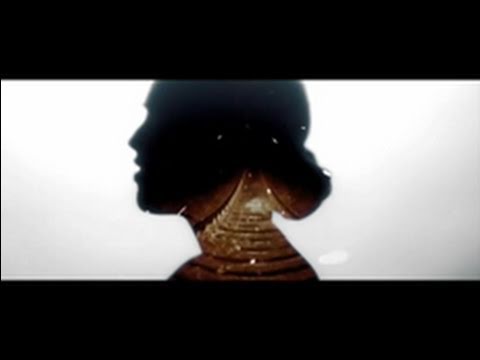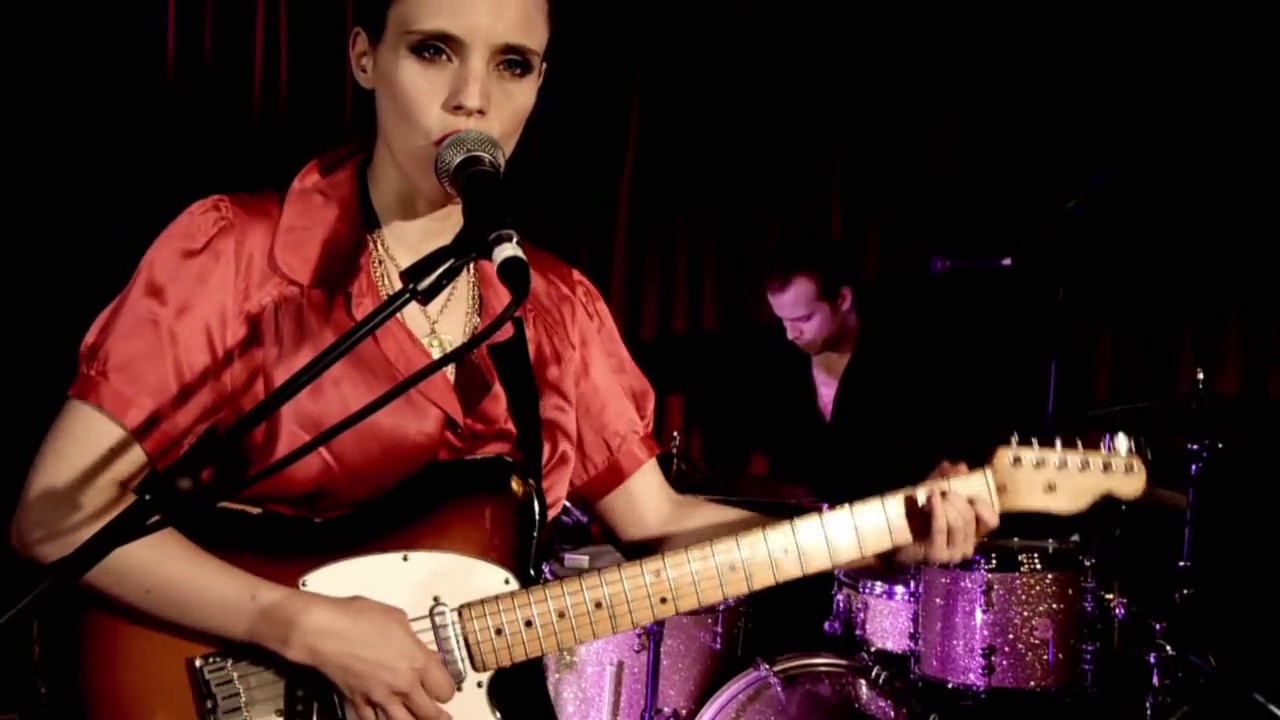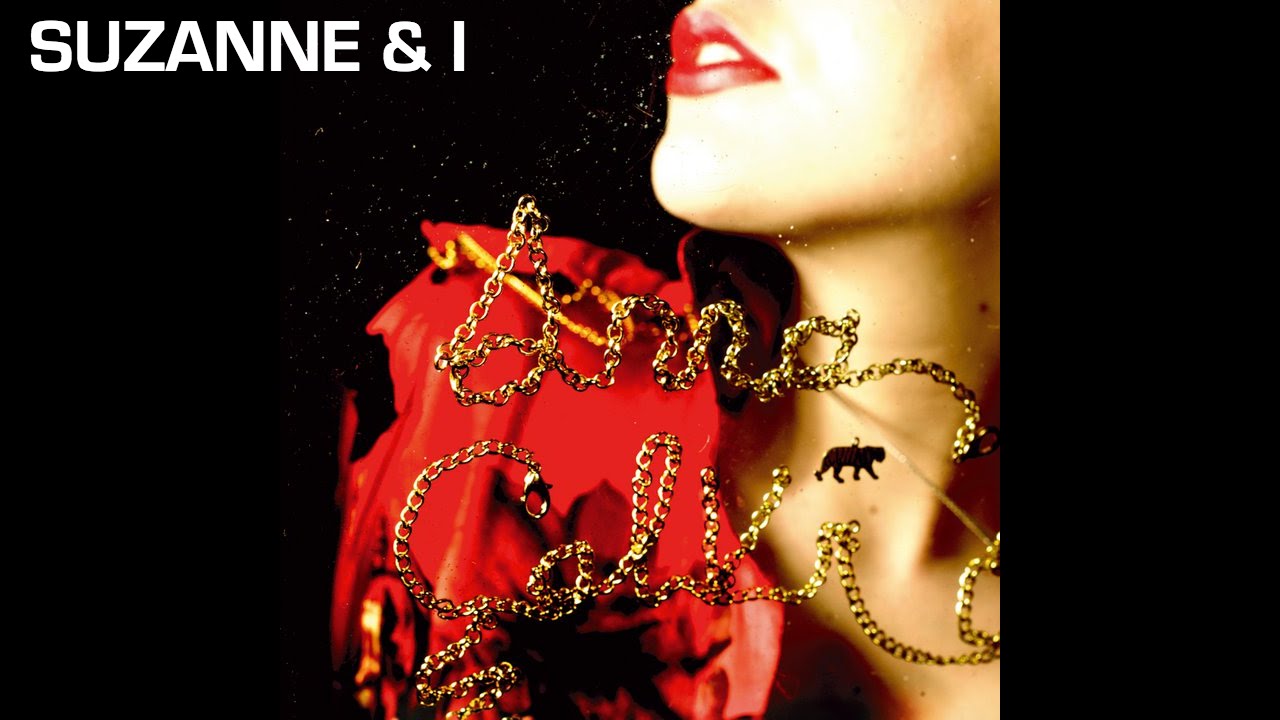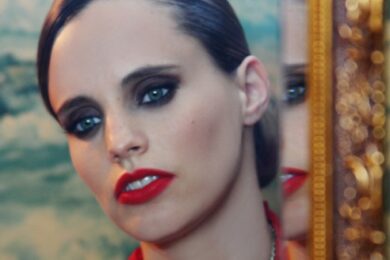Anna Calvi’s eponymous debut album is a thing of natural beauty. Atmospheric, dramatic, dark, brooding and thrilling, it is certainly the record I’ve played most this year. And live too, Calvi and her small troupe of musicians create an intimacy that draws you in only to then blow you away with the drama of it all. In person she’s even smaller than you’d imagined, but like on stage, she has an enigmatic presence – even when she isn’t saying very much. She appears to think about each response deeply, and when I ask a question that’s not really a question, she mocks me with a titter. There’s clearly intelligence behind her imperturbable and flinty blue stare, though you sense being interviewed isn’t her favourite part of the job. She’s engaging, don’t get me wrong, but while many artists will lie and say it’s all about the music, Calvi clearly got into this to be a musician.
Already a critical darling, the wider public are waking up to Calvi’s brilliance thanks most recently to impressive turns on Jools Holland and at Glastonbury. But it’s in France that, thus far, she’s had her biggest commercial success. "I think there’s a tradition of romantically minded singers that do passionate work, which I think is part of the reason I seem to have gone down well there," she says. Can she sing anything in the language? "Yeah, I can sort of sing ‘Jezebel’ [her Edith Paif cover] in French. I haven’t yet got the courage to sing it in French to French people. But yeah, it’s something I’d like to do." She’s just returned from a tour of the US and will be playing the Quietus stage at Field Day this August. Having seen her in smaller venues I wonder how it might translate to arenas and in the open air.
Might you consider bringing in more musicians for larger audiences, like at Field Day, where the chances of distraction for people who’ve come to see a whole load of bands rather than just you are greater?
Anna Calvi: No, I really like working with less because I think it encourages you to be imaginative. And I like to imagine the guitar is almost like an orchestra, like an extension of my voice, where it’s just a real tool for expression. With less you can do more with it and I really like the dynamic of just the three of us. I think it’s a good number to have in a band and I think we can be very dynamic. It’s very intimate because there are only three of us but with the harmonium and with the guitar style that I choose to have you create a huge sound as well, which is the best of both worlds really.
You seem to play clean with a just a little bit of reverb. You open the album with the instrumental track ‘Rider To The Sea’, and the shows as well, which, given how naked it sounds – just you and a guitar – seems rather brave to me…
AC: For me it’s a personal choice but I don’t like to have lots of pedals, I like to create sounds with my hands. That’s how I relate to the instrument. So yeah, I just try and kind of… I feel very natural playing the guitar, it feels part of me, and I don’t feel like I have to hide behind lots of sounds.
When Jack White went from The White Stripes to The Raconteurs he suddenly had the freedom to solo like a beast. Are you ever playing and wishing you could be free to show off more without having to colour in other areas?
AC: No, not really. Definitely not having a bass player makes me play differently but I like that, I like the challenge of it. ‘How do I create a bass sound and a lead sound at the same time?’ That’s the kind of thing you should think about when you’re playing. You should be setting challenges for yourself, because that’s what keeps you creative.
White did so much in The White Stripes, but once free of the burden of making the majority of the sound he could launch himself off into the cock-rock stratosphere…
AC: Because there were only drums, you could get a real sense of what his playing was all about [in the White Stripes]. I haven’t really heard that much of The Raconteurs but I’d imagine if he’d come out with that band first no one would know what a great guitarist he was, or what particular sound he had, because there’s so many other things, so much crap, crowding the sound. I think space in music is the best thing. Room to let the music breathe, and it’s something The White Stripes had, but most bands don’t utilise it enough.
David Lynch and Gus Van Sant are two of the names that I’ve read influence you. Are films important to you and does it inform your music?
AC: Well, I see music quite visually and I like to create atmospheres… I like to try and create a whole world in the space of a song. I definitely get moved by beautifully shot films, it’s definitely something that interests me, but the thing that has the most effect on me is other people’s music; just music in general. That’s what really moves me and inspires me.
Nick Cave has expressed a liking for your music. And Brian Eno has not only been wildly singing your praises but also recorded backing vocals on the album. How does it feel to have Eno as a fan?
AC: It feels good [laughs]. It’s great when creatively minded people like your work, you know? It really means a lot and I feel really lucky to have the support from the people I do. And yeah, Brian Eno is an incredible artist.
Roxy Music vs solo ambient works. Any preference?
AC: I think in general throughout the years he’s always put out interesting work, and I’m particularly fond of his ambient work. But you know, I like all of it. He’s had a very long and rich career creatively.
He said you were the biggest thing since Patti Smith. Do you take that on board and say ‘yes I am’?
AC: I think he was just expressing his enthusiasm. I don’t think he thought about it and analysed whether I would be as big as Patti Smith… And for him to like my work as much as he does is amazing for me. I don’t feel like I have to be as big as Patti Smith, I don’t feel like I have to be as big as anyone, it’s not what I’m doing.
A lot of press has been favourable as well, though the comparisons with PJ Harvey seem misjudged…
AC: Mmmm, well I think it’s any woman who comes along playing songs that aren’t pop and she has a guitar… She’s going to get compared to PJ Harvey. When PJ Harvey first came out she always got compared to Patti Smith. There’s always someone, when a new artist comes along that’s going to get referenced to someone, and if it’s rock it’s going to be PJ Harvey. I don’t think there’s any similarity between us, musically. She’s great but she’s not someone I’ve learnt a lot as a songwriter from. It doesn’t particularly speak to me in the way that some other artists have. That doesn’t mean I think in any way that she’s not a really talented artist, because she is.
Perhaps there are undertones of sexism in it…
AC: It’s definitely lazy. I don’t know how much it’s sexist. Maybe for some people it is. Female artists and male artists definitely get treated differently. I try not to spend too much time worrying about it.
Do you think there’s a lack of imagination in guitar music right now?
AC: I think for me personally a lot of bands with boys going ‘di-ni-ni-ni-ni-ni…’, you know, a four-piece, everyone is doing the downbeat and singing in a faux-punk kinda way, [it] doesn’t particularly speak to me. It doesn’t mean it’s bad, it’s just for me it’s not really happening. I’m not that interested in trying to keep up with what’s new and what’s hot. When something speaks to me I will fall completely in love with it and I’ll become obsessed with it, but it doesn’t happen that often. In fact the last person I probably had that with was Antony and the Johnsons. He’s a really original and inspiring artist.
It’s depressing, though, this tsunami of guitar bilge – put into perspective when you think Jimi Hendrix has been dead 41 years and he still sounds more imaginative, vibrant, fresh, relevant…
AC: Yeah, but it’s always been like that, really. There are always a few people who are doing great stuff on the guitar, but then there are always people who just play power chords and that’s fine. Jimi Hendrix was just such a huge talent that he could have been around any time. I think that’s what shines through. Obviously he was a real pioneer but you really hear his soul when he plays, and that’s really rare to have a musician who you feel is expressing everything of themselves. But it’s kind of nice that it’s rare, because when it happens it really means something.
So where did the Edith Piaf fixation come from?
AC: It’s not really a fixation, I just think she’s great. I love how raw she is. When she sings it just feels like you’re seeing everything of her and it’s really vulnerable, but it’s really powerful as well. I love the way she combines real vulnerability with strength. I find it very inspiring, obviously. It’s just the idea of really giving everything, to every single note that you sing, to be present in everything. It’s quite rare, singers today don’t really do it too much, but for the singers that do do it like her or Nina Simone, or Maria Callas, I just find it incredibly moving. I listened to her a lot when I was learning to sing.
And Billie Holiday?
AC: Yeah, she’s another one where it just feels like her notes are treasure, you know? Like nothing is throwaway, every single thing is sung from the heart. It’s really incredible.
Do you think an element of tragedy helps?
AC: I think part of being really honest with your voice is to access pain, but I don’t think you have to have had a terrible life to be a good singer.
Where did you come across these artists?
AC: My parents have a big record collection and they played me lots of different stuff from an early age. Even when I was five they were playing me Django Reinhardt and the Stones so it was a really good musical education. It just kind of continued. I suppose I’ve always had a fascination with music, and always wanted to find new things to inspire me, so it’s a combination really.
Some kids reject their parents music…
AC: I was lucky, I never got into Kylie and Jason. I don’t know why.
There’s a very red aesthetic to your image. Lips, clothes… Where did it come from? It’s tied up with danger of course…
AC: It’s not really just red, my dress is a male flamenco dancer. I just felt I wanted the outfits to express the passion in my music. I feel the outfits really express the passion in flamenco music; I really have always loved flamenco music, so that’s where the style of clothes really came from.
Wearing a male outfit is following in a great lineage of androgynous musicians…
AC: I think there’s always something interesting about not playing to stereotypes of what a man or woman is supposed to be. Whenever anyone’s done it there’s something about it, and I think the main thing for me is that I prefer the outfits of the male dancers. Also I like the sense of strength it gives me. Also it just suits my figure; I like high wasted trousers. I think they’re actually really feminine – a kind of combination of being very masculine, but very feminine as well.
So, any long term ambitions? Any Stalinist five year plans?
AC: Not really. I want to get better. That’s my ambition, to keep getting better. I have things I’d like to do. I’d like to write a piece for an orchestra, I’d love to write a piece for dance… You know, extra projects, as well as writing music that I sing.
Do you mean musical virtuosity?
AC: No, not really technically. I mean more like just continuing to evolve as a songwriter. It’s not like, ‘Oh, I want to play faster. I want to finger tap.’ It’s more about just growing as an artist.
Anna Calvi will be playing the Village Mentality stage – curated by us at The Quietus – at Field Day this year on August 6, along with Omar Souleyman, Konono No. 1, The Sea and Cake, About Group, Ariel Pink, Faust, Mark Kozelek and Gruff Rhys. For more information and tickets, click here.

